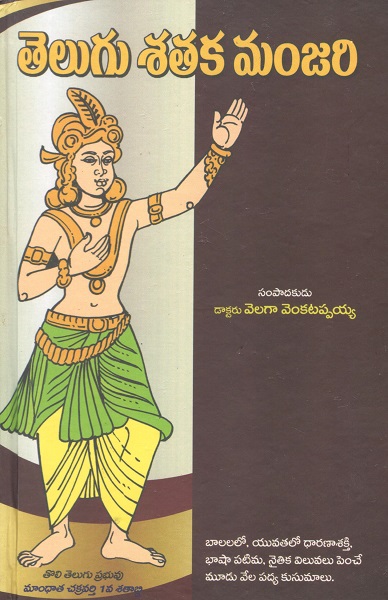
ORIGINAL POETRY IN TELUGU (with English translation).
తెలుగు పద్యాలు
నా భార్య వాణి 61 వ జన్మ దినానికి (షష్టి పూర్తి, 30 జూన్, 2015) ఒక పద్యం కానుకగా ఇద్దమని చందోబద్ధంగా చంపక మాల పద్యం రాశాను. అదే స్ఫూర్తితో వాణి శతకం అని ప్రారంభించాను. అది రెండు వందల పద్యాలు పూర్తయినాయి. అన్నీ ఒకే సారి ప్రచురించడం కంటే రోజుకి పదిహేను పద్యాలు ప్రచురిస్తే బాగుంటుందని ఈ రోజు ప్రారంభిస్తున్నాను. చివరి భాగం జూన్ 30 న. ఇవి కూడా తప్పులు దిద్దిన తరువాత పుస్తకంగా ప్రచురిస్తాను. దీవించండి!
On the occasion of the 61st birthday of my wife, on 30th June, 2015, I wanted to present her with my first poem in Telugu written as per Grammar rules. I wrote it in Champakamaala, one jewel in Telugu grammatical poems. With the same enthusiasm I started penning Vani Satakam, with 100 such poems. I ended up writing two hundred, thereby making it Vani Dwisati. Instead of publishing all on one day, I wanted to publish 15 poems today, followed by selections thereafter to be completed it on 30th June. I will publish this on 30th June after getting them corrected by experts. Bless us!
This contains the Poem, the Telugu meaning of the poem, then English translation.
తెలుగు భాషలో ఛందోబద్ధంగా పద్యం వ్రాయడం అతి క్లిష్టమైన ప్రక్రియ. 11 వ తరగతి తరువాత తెలుగు వ్యాకరణంతో పూర్తి బంధం తెగి పోవదమూ, తదుపరి జీవితమంతా ఎక్కవగా ఆంగ్ల భాషా పుస్తకాలే చదవడం వల్ల తెలుగులో కొంతనైనా చందోబద్ధంగా పద్యం రాయాలన్న నా కోరిక అలానే మిగిలి పోయింది. ఐతే నా తృష్ణ చల్లారనిది . ప్రయత్నిస్తూనే ఉన్నాను. కాని ఏనాడూ ఒక్క పద్యం కూడ పూర్తి చెయ్యలేదు.
It is a difficult proposition to attempt to write a poem in Telugu grammatically. I lost total touch with Telugu grammar rules which are complex after my 11th class. As I was totally engrossed in reading and dealing in English, this desire to write a poem in Telugu remained a dream. But my appetite is unquenchable. So, time and again, I have been trying and failing in the process. But, I could never complete even a single poem.
ఎట్టకేలకు, నా రాణి వాణి పై ఒక పద్యం మొదలు పెట్టాను. చిన్నతనాన నేర్చుకున్న వ్యాకరణ సూత్రాలు, లఘువులు, గురువులు, వృత్తాలు, యతి, ప్రాసలు ఒక్క సారి మననం చేసుకున్నాను. నా భార్య సలహా తీసుకున్నాను. పద్యం పూర్తయ్యాక. ఆమె కొన్ని తప్పులు దిద్దింది.
ఐనా కొన్ని లోపాలు ఉండవచ్చు. నాకు తెలిసి ఒక చోట యతి గతి తప్పింది. కుదరలేదు, సరైన పదం. వదిలెశాను.
ఇక మీ ఓపిక.
At last with the blessings of Goddess Vani and with wishes from my wife Vani, I recalled the grammar rules I learned during my school days, referred a few books, took my wife’s advice, as she knew Telugu better than me and compiled the first poem on Goddess Vani and Vani. This called Champakamala, in Telugu lingo. There might be errors and as I stay in Mumbai, I had no option but to depend on my wisdom. As far as I know, there is one clear error. Please correct, if you have knowledge of Telugu grammar. The full 200 will be available here on my personal blog.
వాణి శతనానికి నాందీ పద్యము.
FIRST POEM AS PROLOGUE TO VANI SATAKAM
కుసుమ లతా విధాన మొక మందర మారుత తుల్య భాషణల్
తరుణివి నీదు భార మతి నేర్పున తీర్పున మ్రోయు ధీమతిన్,
చిన్నతనమందె కష్టముచె భారము మీరగ తీర్పున భరిం
చి సుమ పరీమళంబు శుచి జల్లిన నా యలివేణి వాణికిన్!
Dedicated to Goddess of Knowledge, Vani.
నా చదువుల రాణి వాణికి అంకితం.
Like a creeper blooming with flowers that moves lightly during wind, your words are so mild and touching. As a lady of the house, when you entered our house, you bore your burden with proper judgment and intelligence. When very young you faced unbearable troubles with aplomb. Like the flower creeper, you spread the sweet smell of flowers in my life. I dedicate this to the one woman in my life, Vani.
వాణి శతకం
1.
రామ యనిన నాడు రసమయ భావన,
రామ యనిన నేడు కలుగును కీడు,
మతము పెరు చెప్ప మలమల మాడ్చరే,
వాణి పలుకు మాట నాదు నోట!
తాత్పర్యము (తా):
ఒకప్పుడు రామ అని పలుకగానే నర, నరాల్లో భక్తి భావన కలిగేది. నేడు రామ అనగానే ఏమి ముంచుకొస్తుందోనని భయం. ఎవరి మతము పేరు వారు చెప్పుకోవడానికి కూడా భయ పడే పరిస్థితి. (ఇదేమి సెక్యులరిజం అని)
English:
Once upon a time, if we chanted the name of Rama, people used to go into a trance. Today, the very word Rama became a taboo. Verbal attacks are increasing on people who say they belong to a particular religion. (Is it the secularism we had dreamed of?)
2.
నాదు మతముయనిన నగవుల పాల్చేయ
ఇట్టి రీతి ఇంక ఎన్ని దినము
లింక వేచి చూడ లావు లేదు ప్రభూ
వాణి పలుకు మాట నాదు నోట.
తాత్పర్యము (తా):
నా మతము పేరు చెప్పుకుంటే నన్ను నవ్వుల పాలు చేస్తున్నారు. ఇలా ఇంకెన్ని రోజులు, ప్రభూ? వేచి చూడ నాకు శక్తి లేదు, రామా?
English:
I am becoming a laughing stock to say the name of my own religion. How many years can I wait like this my Creator? I am losing power to wait further.
3.
జర్నలిజము పేరు జగడమె నడవడి
పేరు గొప్ప వూరు పెద్ద గుబిలి
నోరు దెరువ రాదు నిజము యెన్నటికిన్,
వాణి పలుకు మాటనాదు నోట!
తాత్పర్యము (తా):
పేరుకి జర్నలిజమే. (ఓ గొప్ప శాస్త్రమే).కానీ ప్రస్తుతమున్న జర్నలిజం కేవలం, జగడానికి మారు పేరయి, జగడిజం అయిందని చెప్పుకోవచ్చు. పేరు గొప్పే కానీ ఒక శకున పక్షి లాగా ఎప్పుడూ చెడు చూడడమే అలవాటైంది (గుబిలి: ఒక రకమైన శకున పక్షి) పేపర్ తెరిస్తే అన్నీ అబద్ధాలే.
English: Journalism is a great subject. But, today, it has become synonymous with litigation, and apt to be named as “Jagadism”. Name is great but like a bird that always represents a bad Omen, Media is looking at the bad only. Many a rumor is spread without basis.
4.
దొంగతనమొ ఏమొ దొరల చేతి వడువొ
చర్చి బగుల గొట్ట సెక్యులరులు,
వ్యాండలిజము యనుచు వీధిపై మొరుగగ,
వాణి పలుకు మాట నాదు నోట!
తాత్పర్యము (తా):
చర్చులు పగులగొట్టే పని ఎవరు చేశారు? దొంగతనమైనా అయి ఉండాలి లేదా పెద్దలు పూనుకొని పని గట్టుకొని చేసి ఉండాలి (ప్రభుత్వాన్నిఇరుకున పెట్టడానికి). సెక్యులరిజం పేరుతో ఇలాంటి తప్పుడు పనులు చేయడమే కాకుండా వీధి కెక్కి “వ్యాండలిజం” అని మొర్రుగుతున్నారే? (ఒడువు: పూనిక)
English: In the country, at many places churches were broke open. It must be the act of thieves or the determined effort of some secularists to defame government, by attacking churches and barking on streets in the name of “vyandalism”.
Note: This was written in the specific context and is not a general issue.
5.
నీదు పనిని నీవు నిపుణత సేయంగ
శివుని యాఙ్న ఏల శివుడు ఏల
శివుడు ఏమి సేయు సోమరి నీవైన
వాణి పలుకు మాట నాదు నోట!
తాత్పర్యము (తా):
నీ పని నీవు నిపుణతతో చేయకుండా, శివుని ఆఙ్న కాలేదని శివుణ్ణి నిందిస్తే లాభమేమిటి. నువ్వు సోమరి వైతే శివుడు మాత్రం ఏం చేస్తాడు.
English:
If you don’t do do your work skillfully and blame the Lord, what can the Lord do? If you are lazy, in what way can He come to your rescue?
6.
కాలు డొచ్చు వేళ నలుగురు నిను మోయ
కాలు వేళ నెవరు కాన రారు
బంధు మిత్రు లంచు (లెనసి) బతుకంత వగచెదె
వాణి పలుకు మాట నాదు నోట!
తాత్పర్యము (తా):
బంధువులు, మిత్రులు, నా, నీ బేధాలతో బ్రతుకంతా వేదన పడతావు కాని, కాలుడు (యముడు) వచ్చే సమయానికి నలుగురైనా నీ వెంట ఉండరు, నీ కట్టె కాలుతున్నప్పుడు ఎవరూ కన్నీరైనా కార్చరు. (ఉన్న నాలుగు రోజులు అందరూ నీ వాళ్ళే అని, ఫలితం ఆ భగవంతుని మీద వదలమని భావన)
English: As long as you live, you cry for friends and relations and thoughts of “mine” and “yours”. But when the Lord of Death approaches, you will not find four people to carry your body, nor any one really sheds tears for you at the pyre. (So, during life time, develop a sense of belonging to the society and pray the Lord, as far as possible. Help others)
7.
బదుకు బ్రహ్మచారి ముదురు బెండ వలెనె
భార్య నిచ్చి చూడు మారు లేత
పడుచు జంట యనుచు జనులెల్ల పొగడరే
వాణి పలుకు మాట నాదు నోట!
తాత్పర్యము (తా):
మానవుల ద్వంద నీతి ఈ పద్యంలో వర్ణించ బడింది. పెళ్ళి కానంత వరకు, బ్రహ్మచారిని ముదురు బెండ కాయ అన్న లోకమే పెళ్ళి కాగానే అతను చాలా లేత వయసు కాడు అన్నట్లు ఆ జంట కనబడితే ” చూడు! పడుచు జంట చూడ ముచ్చటగా లేదూ?” అని ఆశ్చర్య పడతారు కదా!
English:
Hypocrisy in the talk of general public is described in this poem. As long as a boy is not married, he is mocked as a “fully ripe and useless okra” (can’t cook it). But once he gets married, the same couple is called, “See! How the young couple is looking!”
8.
చెట్టు పుట్ట నరికి చేతనమ్ము తెగటార్చి
నేల యంత కుళ్ల నీవు బొడువ
యవని కుంగె నీదు యతియాస గనియును
వాణి పలుకు మాట నాదు నోట!
తాత్పర్యము (తా):
చెట్లను నరికి, పర్యావరణ చైతన్యాన్ని చేతులార చంపి వేసి, భూమిని కుళ్ళ బొడిచావు కదా. నీ అత్యాసకు భూమి కుమిలి, కుంగి కంపించింది కదా!
English: You cut trees. You killed the environment with your hands all for your selfish purposes. Seeing your selfishness, Earth cried, depressed and drooped and quaked with anger.
9.
వొక్కసారి భూమి విలవిల యరువంగ
పుట్టకొక్క రయిన భూమి జనులు
దైవ ఘటన యనిన దను యేమి సెయునొకో,
వాణి పలుకు మాట నాదు నోట!
తాత్పర్యము (తా):
ఒక్కసారిగా, భూమి పెద్దగా అరిచి కదిలి పోగా, చెట్టు కొకరు, పుట్ట కొకరు అయిన ప్రజలు ఇది దైవ ఘటన అని అనుకుంటే ఏమి ప్రయోజనం? మీ స్వార్ధానికి మీరే బలవుతున్నారు కదా? ( నేపాల్ భూకంపం సందర్భంగా ఇకనైనా భూమిని కాపాడుకుందాం అని చిన్న సలహా వంటిది)
English: When the Earth, crying loudly, moves away from its hemisphere, people ran helter skelter crying for the lost ones and putting the blame on God. What can He do if your selfishness reached a point of no return? (These two poems were penned as an advice to people to, at least from now, protect our Earth on the tragic incident of quakes in Nepal)
10.
ఎర్ర చందనంబు ఎటుబోయె తెలియదె
యొక్క ముద్ద కొరకు యూరి జనులు
మారణాగ్ని యందు మలమల మాడరే
వాణి పలుకు మాట నాదు నోట!
తాత్పర్యము (తా):
ఎర్ర చందనం ఎక్కడుందో మనకి తెలియదు. కానీ, మల మల మాడ్చే జఠరాగ్ని చల్లార్చుకోవడానికి, అమాయక కూలీ జనాలు, పోలీసులు, స్మగ్లర్ల మధ్య జరిగిన మారణాగ్నిలో మల, మల మాడి పోయారు కదా? (ఆంధ్రాలొ జరిగిన మారణ కాండ పైన)
English: Common man does not know where the red sandalwood has gone. But to satiate their appetite, those daily wagers who came to work for pittance were killed in the cross fire between police personnel and smugglers. How sad? (On recent killings of daily wagers in AP State, India)
11.
హిందువనిన నాడు హరిత వర్ణము గాదె
హిందువనిన నేడు హేయమయెగ
సెక్యులరిజ మన్గ సరితూగమని గాదె,
వాణి పలుకు మాట నాదు నోట!
తాత్పర్యము (తా):
హిందూ మతమనగా ఒకప్పుడు లేత పచ్చని ఆకులతో నిండిన చెట్టు వంటిది కదా! అదే హిందూ మతమంటే తాను పుట్టిన దెశంలోనే హేయమయినదిగా భావించబడుతోందే? రాజ్యాంగంలో చెప్పింది “సర్వ మత సమ భావం” సెక్యులరిజం అని కదా!
English:
In days of yore, the Hindu religion was like a tree filled with tender green leaves. Today, the same religion is taboo in the nation of its birth. Did Constitution not say that “secularism” means “equality of religions”?
12.
ఆడ బిడ్డ పుట్టు నాడ నీ వనృత
మనుచు మాట లాడ జనులు నిజము
తెలియు ననుచు యాడ నలుసు నటె విడిచె
వాణి పలుకు మాట నాదు నోట.
తాత్పర్యము (తా):
“అబద్ధాలు ఆడితే ఆడ పిల్లలు పుడతారని” నిన్ను భ్రమలో పెట్టిందా అమ్మా, ఈ లోకం? నువ్వు అబద్ధాలాడావని నిజం బయట పడుతుందేమోనని ఆడ పిల్లని పురిట్లోనె వదిలి వచ్చావా తల్లీ? (ఈ ప్రపంచంలో అబద్ధమాడని వారెవరమ్మా?)
English:
Did the superstitious belief that if you beget a girl child it is proof you told lies, make you fear and leave girl child in the hospital bed? (In this world who lives without telling a lie?)
13.
కరణీకాలు పోయినా కొంచెం పాత వాసన. మా తాతగారు కరణమే.
మరణమయిన నేమి కరణము దరిరాదు
లెక్క గట్టి అచటె డొక్క చించు
పణము తేక తా మరణమయిన బయటె
వాణి పలుకు మాట నాదు నోట!
తాత్పర్యము (తా):
కరణీకాలు పోయినా కొంచెం పాత వాసన. మా తాతగారు కరణమే.
మరణమయినా (యముడు కూడా) కరణం దగ్గరకు డబ్బులు తేకుండా రావాలంటే భయపడతాడు. లెక్కలు కట్టి అక్కడే యముడి డొక్క చించుతాడు. డబ్బు తేకపోతే యముడు కూడా బయట నిలబడాల్సిందే.
English:
Even if the hereditary Village Officer posts were abolished, still the hierarchy remains. My grandfather was a Karanam too!
Without bringing money, even the Lord of Death, Yama, fears to approach a Village Officer. He makes calculations and audits Yama’s account. If there is no money, even Lord Yama has to stand outside a Village Officer’s house!
14.
రాశి పోసి యమ్మ రతనాలు గొనిరట
నేడు యచట చూడు నీటి కరువు
రతన మంటి సీమ పతన మాయెను కదా
వాణి పలుకు మాట నాదు నోట!
తాత్పర్యము (తా):
అక్కడ ఒకప్పుడు రతనాలు రాశులుగా పోసి అమ్మారని ప్రతీతి. ఈ రోజు అక్కడ నీటి చుక్క కూడా దొరకని స్థితి. రత్నం లాంటి రాయల సీమ ఎంత పతనమయ్యిందో కదా? (రాయల సీమలో కరువు తాండవిస్తోంది. నాధుడేడీ?)
English:
Folklore has it that people used to buy pearls sold on roadside in heaps. Today the area is so dry that one drop of water costs the value of a pearl. What a fall to the Rayala Seema Area? (About the perennial drought in Rayala Seema area)
15.
యముడు యొచ్చు నంచు యెద నిండ భయ మేల
సూర్యు నెపుడు నేలసేయ పూజ
యముడు సూర్యు కొడుకు యోచించ రెటులనో
వాణి పలుకు మాట నాదు నోట!
తాత్పర్యము (తా):
యముడు వస్త్తాడని ఎప్పుడూ భయమే. కానీ సూర్య దేవుడిని మాత్రం రోజూ పూజ చేస్తాం. యముడు సూర్య దేవుడి కొడుకే కదా. (అంటే మనం ఎవర్ని చూసి భయ పడక్కర లేదో వారిని/వాటిని చూసి భయ పడతామెందుకో)
English:
Why do we fear the Lord of Death, Yama and pray to Lord Surya daily? After all,Lord Yama is the Son of Lord Surya. (Means we fear that/him/her that we need not fear)
ఓం నమః శివాయః







